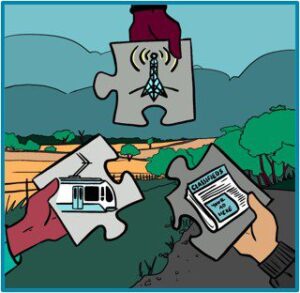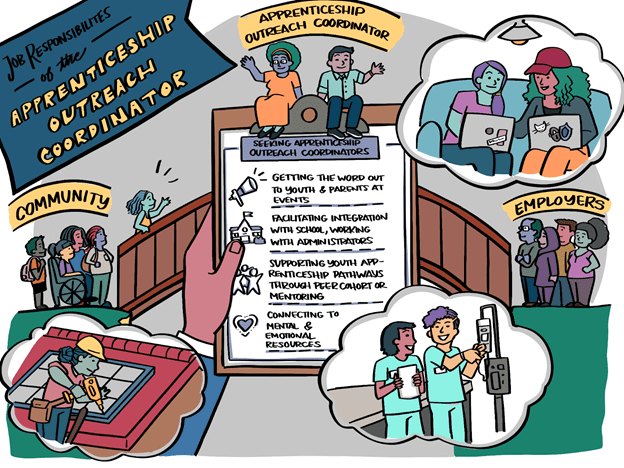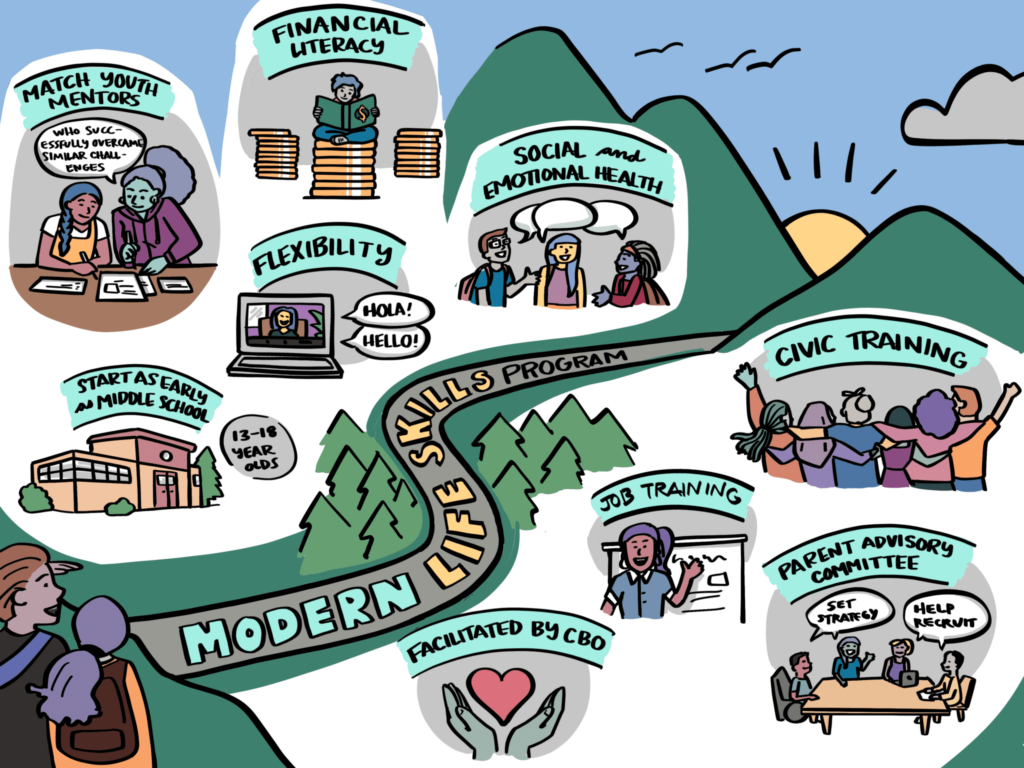Everyone should have the opportunity to have a job or career that they love and that pays them a wage that helps them support their families. But today, there are millions of Californians who don’t have access to these kinds of job opportunities because government officials and employers have created and maintained barriers based on what we look like, where we live or what mistakes we may have made in the past. Many government social service agencies and nonprofit providers in the state are working hard to remove these barriers and connect people to job opportunities, but are still struggling to break down silos and build efficient systems that will help people find the jobs and careers of their dreams.
that helps them support their families. But today, there are millions of Californians who don’t have access to these kinds of job opportunities because government officials and employers have created and maintained barriers based on what we look like, where we live or what mistakes we may have made in the past. Many government social service agencies and nonprofit providers in the state are working hard to remove these barriers and connect people to job opportunities, but are still struggling to break down silos and build efficient systems that will help people find the jobs and careers of their dreams.
The Design Group is a multi-year initiative funded by the James Irvine Foundation Better Career initiative that is designed to address this challenge by bringing together government agencies, nonprofits and local community members to identify ways to ensure that government services are efficiently and meaningfully creating opportunities for people to find the jobs and careers of their dreams. Between January 2020 and September 2021 the Design Group engaged more than 250 people across four local teams in distinct regions of California in order to understand their unique local challenges and design solutions to address them. For each of the four Teams, a local “backbone” organization is tasked with building out the pilot program, with support from its local team members.
Meet the Local Teams
Hover over each block to view four innovative solutions designed by community members for the community.
Alameda
Returning Home Career Grant & Fair Chance Hiring Video
The Returning Home Career Grant provides cash payments to people returning home from Santa Rita Jail, and provides mentorship opportunities to help recipients get connected to jobs or careers that pay salaries that can support a family or start their own businesses. In addition to the grant, the team will also create a ‘Fair Chance Hiring Video. This video will demonstrate challenges faced by legal system-involved adults and help more employers join the growing local network of businesses that adjust their practices to realize the benefits of hiring formerly incarcerated residents.
- Backbone organization: Rubicon Programs
- Team members: Growth Sector, Alameda County Probation Department, & Alameda County Workforce Development Board
Central Coast
Life Skills Mentorship Program
The Life Skills Mentorship Program equips middle school children in rural areas of Santa Cruz and Monterey counties with critical life skills they need to succeed in the modern world, such as financial literacy, social-emotional well-being, entrepreneurship and civic engagement. At least 75% of program participants will be first-generation immigrant young people, and the mentorship program will be specifically geared towards their needs.
- Backbone Organization: Hartnell College Foundation
- Team Members: Santa Cruz County Human Services Department and Workforce Development Board & Monterey County Workforce Development Board
Los Angeles
Connecting Employers to Young Adult Working People
Goodwill of Southern California will create a program focused in South LA and the Antelope Valley regions of LA counties that helps employers hire, retain and cultivate local systems-impacted young adult people - young adult people with experience in the criminal-legal system, foster care system, social services, etc. - through an employer training and employee mentorship program.
- Backbone Organization: Goodwill Southern California
- Team Members: Los Angeles County Department of Workforce Development, Aging and Community Services, Anti-Recidivism Coalition, Los Angeles Brotherhood Crusade, & JVS SoCal
Inland Empire
Apprenticeship System Navigators
Apprenticeships are an exciting way to broaden the pathways to employment. Chaffey College hired two Apprenticeship System Navigators (ASNs) to go into local schools and WIOA youth programs to connect young people with apprenticeship opportunities. The program will focus on identifying and securing apprenticeships for young people who struggle the most to find well-paying jobs, including young people who are experiencing homelessness or who've had contact with the criminal-legal system.
- Backbone organization: Chaffey College Foundation / Intech Center
- Team members: Riverside Community College District, San Bernardino City Unified School District, Fontana Unified School District, & San Bernardino Office of the Division of Apprenticeship Standards at the Department of Industrial Relations
Third Sector is providing Technical Assistance (TA) to each of the four backbone organizations to help get pilots up and running. Third Sector support will help each team by:
- Connecting with people who are directly impacted by the teams’ pilot program in order to improve how the program is run.
- Creating continuous improvement processes that ensure the teams’ pilot is enrolling and engaging people equitably and creating strong impact.
- Connecting pilot programs to funding opportunities to both expand the number of people programs are able to serve and sustain programs after the pilot phase.
Designing Local Solutions
Developing responsive, equitable workforce solutions requires engaging the people you are hoping to serve. Third Sector led the group of 20 Design Group organizations through each phase of the human-centered design process so that local teams could apply lessons learned to engaging members of their local community:
Seek

Asset map. Determine research themes and design equitable engagement strategy. Engage community.
Sketch

Use insights to create empathy tools. Create a problem statement. Align on priority outcomes and metrics. Create practical prototypes to test ideas.
Structure

Test prototypes with community. Connect to policy, data, and funding processes. Draft a continuous improvement process.
For more information on how you might be able to partner with Third Sector to use human-centered design to improve your workforce programming, please contact Sheba Rivera at srivera@thirdsectorcap.org.
Resources from the Design Phase
- Webinars
- Learning Community Session 1 - The Challenge of Staying Connected: Diversity Plans and Remote Interviews That Bridge the Divide
- From Prototyping to Piloting - Lessons on Prototyping: Quicker ways to try out big challenges (Password for recording: BCDGLC-21)
- Facilitation for Design (infographic)
Project Updates

The Better Careers Design Group is supported by a grant from The James Irvine Foundation.


